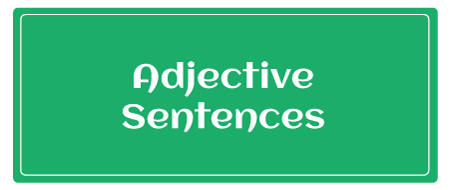Adjective SentencesWe try to utilize descriptive words to express any circumstance, person, item, or unusual phenomenon in everyday life. The words we use to describe items establish the fundamental characteristics of those objects. As a result, such word-groups must be examined in a different category. Adjectives are words that come preceding nouns and describe them. Adjectives describe and characterize the nouns in the statements in which they appear, resulting in a more rich, saturated expressive style. 
As a result, such words are frequently preferred. There are many different sorts of adjectives in the English language. What is an Adjective: Definition and MeaningAn adjective is a word that modifies and emphasizes a noun or pronoun. It gives more details about what the word or pronoun refers to. It is frequently used immediately before the noun or pronoun that it changes. We can use multiple adjectives to describe a noun or a pronoun, and whenever one noun appears before another, it becomes its adjective. However, they do not change or later other adjectives or adverbs or verbs. Adjectives are words that describe the characteristics or states of being of nouns, such as big, wolflike, goofy, blue, fun, and swift. They can also be used to describe the number of nouns: numerous, handful, thousands, and twelve.
The adjectives in the preceding sentences are simple to recognize since they appear directly before the nouns they alter. Adjectives, however, do more than only modify nouns. They can also be used in conjunction with linking verbs or the verbs to be. A connecting verb is a verb that defines a state of being or sensory perceptions, such as to feel, to sense, or to taste.
A predicate adjective is a technical term for an adjective used in this manner. Types of Adjectives
Descriptive AdjectivesAdjectives of quality are called as descriptive adjectives since they describe an individual, a location, or an item. They demonstrate the qualities, sizes, origins, color, form, taste, acts, feel, look, or any other characteristic of nouns and pronouns. Here are some of the adjective sentences
He slammed his forehead into the glass window. (In this case, the noun 'glass' functions as an adjective since it characterizes the noun 'window.') Proper AdjectivesProper adjectives are adjectives generated from proper nouns, such as Swiss truffles and Italian spaghetti. They are, nevertheless, commonly known as adjectives of quality. Adjective Sentences
Quantity AdjectiveQuantity adjectives specify the number of nouns and pronouns. Adjective Sentences are;
Adjectives with Numeric Values or Numeral AdjectivesAdjectives of number indicate the number of items or people being referred to. They also tell us where the person or object is in the hierarchy. These adjectives are also referred to as numeral adjectives. Here are some Adjective Sentences
Interrogative AdjectivesInterrogative adjectives are terms that are used in conjunction with nouns to ask questions. Adjective Sentences are;
Demonstrative AdjectivesDemonstrative adjectives are adjectives that point out nouns. These indicate whether the noun they are referring to is singular or plural, as well as whether it is situated near or far away. The term demonstrative implies 'pointing out.' The query, 'which?' is answered using demonstrative adjectives. Here are a few Adjective Sentences for the same;
Possessive AdjectivesPossessive adjectives are adjectives that indicate possession or belonging. Possessive adjectives such as my, your, his, her, its, our, and their are often used for nouns to indicate possession. Here are a few Adjective Sentences
Coordinate adjectivesA comma or the term "and" must be used in the sentence to separate coordinate adjectives. When two adjectives change the same noun in a statement, they are said to be coordinated.
However, just because two adjectives occur adjacent to each other does not imply that they are coordinate. An adjective and a noun may combine to produce a single semantic unit that is then changed by another adjective. The adjectives in this situation are not coordinate and must not be separated by the commas.
It can be challenging and tricky to decide in some instances. So, to test it, try adding "And". Like can we write this shabby and woolen sweatshirt? No, Since we are not talking about a sweatshirt that is shabby and woolen. It's a woolen sweatshirt that is shabby. Another way is reversing the order. Can we say gold antique locket? No, since the gold locket is an independent unit. Adjective DegreesAdjectives are classified into three types: absolute, comparative, and superlative. Absolute or Positive adjectives describe something in and of itself.
Comparative adjectives, as the name suggests, compare two or more items.
Superlative adjectives denote that something possesses the maximum level of the attribute in the issue.
Examples of Adjective SentencesAdjectives are words that express the characteristics of a noun or a pronoun. These words come before a noun or a pronoun. These are also called as noun/pronoun modifier terms. We've compiled a list of straightforward and easy-to-understand adjective sentences for you.
Next TopicConjunction Examples
|
 For Videos Join Our Youtube Channel: Join Now
For Videos Join Our Youtube Channel: Join Now
Feedback
- Send your Feedback to [email protected]
Help Others, Please Share









